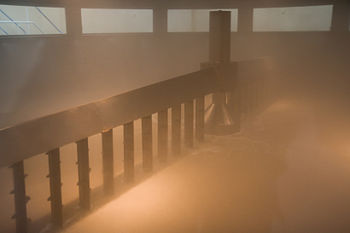Decoction is a method of extraction by boiling of dissolved chemicals from herbal or plant material, which may include stems, roots, bark and rhizomes. Decoction involves first mashing and then boiling in water to extract oils, volatile organic compounds and other chemical substances. Decoction can be used to make herbal teas, teas, coffees, tinctures and similar solutions. Decoctions and infusions may produce liquids with differing chemical properties as the temperature/preparation difference may result in more oil-soluble chemicals in decoctions versus infusions. The process can also be applied to meats and vegetables to prepare bouillon or stock.
A decoction is also the name for the resulting liquid. Although this method of extraction differs from infusion and percolation, the resultant liquids are often functionally similar.
Etymology

The term dates back to 1350â€"1400 from present participle stem of Latin decoquere (meaning to boil down), de "from" + coquere "to cook".
Use

In brewing, decoction mashing is the traditional method where a portion of the mash is removed to a separate vessel, boiled for a time and then returned to the main mash, raising the mash to the next temperature step.
In herbalism, decoctions are usually made to extract fluids from hard plant materials such as roots and bark. To achieve this, the plant material is usually boiled for 8â€"10 minutes in water. It is then strained.
See also

- Concoction
- Percolation
- Infusion
- Maceration (food)
- Tincture
- Herbalism
References
External links
- How To Make a Herbal Decoction from unexplained.net
